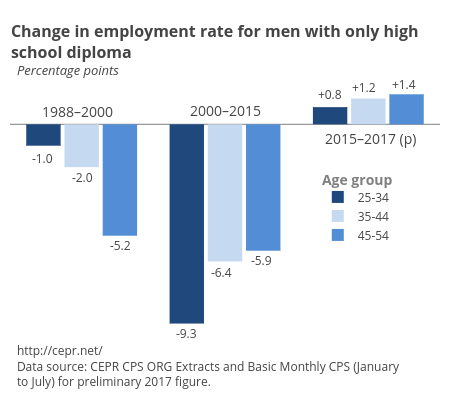September 11, 2017
The drop in employment rates among workers — and especially men — without college degrees has been widely noted. The employment rate for men over the age of 25, with just a high school diploma is down by more than 5.0 percentage points compared with its pre-recession level in 2007. It is down by more than 7.0 percentage points when compared to its 2000 level.
While this drop in employment rates is not in dispute, the explanation is. The predominant view in the economics profession is that the drop is explained mostly by changes in the labor market and changes in the motivations of this group of men.
The labor market explanation hinges on the idea that the spread of technology has reduced the need for workers without more education. We need fewer people now to dig ditches or to turn screws on assembly lines. This argument holds that the declining employment rate among men is part of a long-term trend, so we shouldn’t find the drop in recent years surprising.
The motivation explanation is that these workers spend their time playing video games and watching internet pornography, which they find preferable to work. Proponents of the motivation explanation also point to the real and growing problem of opioid use, which can make workers both unable to work and unable to pass a drug test. The data on employment and unemployment rates for different groupings of young men with just a high school education provides valuable insights on the issue.
The figure below shows the change in employment rates between 1988 to 2000, 2000 to 2015, and 2015 to 2017 (first seven months) for three different age groupings of men with just high school degrees.
There are two noteworthy points about these figures which apply to all three age groupings. The first is that the drop in the employment rate from 2000 to 2015 was far larger than the drop that took place from 1988 to 2000. For men between the ages of 25 and 34, the decline in EPOPs was one percentage point between 1988 and 2000; it was 9.3 percentage points between 2000 and 2015. For men between the ages of 35 and 44, the drop was two percent in the first period, compared to 6.4 percent in the second period. And for men between the ages of 45 and 54, the drops were 5.2 percent and 5.9 percent, respectively.
The other point worth noting in these figures is the substantial increase in the employment rates for all three age groupings between 2015 and the first seven months of 2017. This could be viewed as surprising given that the economy was thought to be at or near full employment by many economists at the time. The 5.3 percent year-round average unemployment rate for the year was somewhat below the Congressional Budget Office’s 5.4 percent estimate of the NAIRU at the time. If this estimate was accurate than any substantial reduction in unemployment below this 5.4 percent target should have led to a sharp uptick in the rate of inflation. As it has turned out, the unemployment rate has dropped by roughly a full percentage point and there has been no uptick in the rate of inflation.
This drop in unemployment has been associated with a 0.8 percentage point rise in employment rates for men with just high school degrees between the ages of 25 and 34, an increase of 1.2 percentage points for men between the ages of 35 and 44, and a rise of a rise of 1.4 percentage points for those between the ages of 45 and 54. This suggests that many of the less-educated workers who were thought to be structurally unemployed in 2015 were willing to put aside the Internet porn and video games when more jobs opened up over the next two years. It certainly raises the possibility that even more workers will take this leap if the labor market offers additional opportunities.







